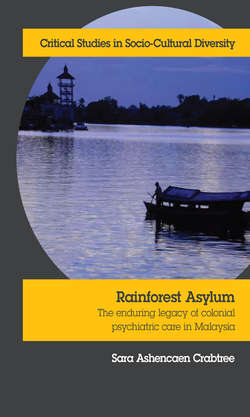Читать книгу Rainforest Asylum - Sara Ashencaen Crabtree - Страница 20
На сайте Литреса книга снята с продажи.
Ethics and fieldwork
ОглавлениеEthical considerations permeated the fieldwork experience, one of the main ones being how far I should involve myself in those events taking place around me which I interpreted as being of a dubious nature. On some occasions, I felt that I should intervene, whilst on others I remained uncertain and kept silent, inducing anxieties about tacit collusion, which remained unresolved. Two short examples serve to illustrate this dilemma quite well. The first took place during an informal chat with a medical assistant who was talking about his job in an animated fashion. Close by a male patient was aiming vicious kicks and blows at another who was cowering without retaliation. It is very likely that this would have continued if I had not quite quickly drawn the medical assistant’s attention to what was taking place a few yards behind him. My interference at this point I felt to be perfectly proper behaviour, however on another occasion during the early days of fieldwork I witnessed a woman patient approach a nurse to ask for a sanitary towel. A brief wrestling match ensued while the nurse attempted to expose the woman’s naked genitals in public to verify that the patient’s menses had really begun. Judging from the patient’s reaction this was clearly a humiliating violation of personal privacy, but one in which I did not intervene but instead carefully noted.
The first example shows me in a paternalistic light as the two men were patients who also suffered from learning disabilities. I also assumed at the time that the medical assistant seemed to be momentarily neglecting his duties, perhaps because I was distracting him, and that therefore this accidental omission gave me license to interfere. In the latter case, the emancipatory aims of this study notwithstanding, I was uncertain of how much authority I could bring to bear on the situation, and whether my primary role was to observe or to intervene. Whilst naturally the self-interested thought flickered through my mind that interference between a nurse and her patient would also jeopardise my tenuous standing on the ward, and consequently my study.
Subsequently I witnessed other episodes involving staff and patients that worried me, but more often, I was presented with low-key dilemmas; for example, one woman that I got to know quite well asked me to intercede with the staff on her behalf. Once or twice I did bring these kinds of matters to the attention of the staff, but most of the time I tried to encourage patients to voice their own concerns to the appropriate authority. I wanted to avoid being seen as either an unorthodox member of staff or alternatively as an adopted advocate on patient issues. Thereby I found myself neatly caught in quandaries and dilemmas as a researcher faced with actual instances of oppression in the field. I reasoned that either situation would probably interfere with developing relations with groups of informants, as well as probably contravene my agreed role. Therefore, caught on the horns of a dilemma I also attempted to confine my role to simple observation and did not interfere with events taking place around me, yet the issue remained, perplexing, distressing and irresolvable.
In relation to these kinds of issues, Nettle (1996) describes how she was able to draw clear boundaries between her brief as a researcher and deeper involvement in the concerns of psychiatric patients. While Kleinman (1991) points out the difficulties of managing negative emotions towards events and participants in the field, and that these feelings express personal values through which a process of deeper reflection and analysis is usually distanced by time and place. Kim Lützén, (1996: 79), however, acknowledges that ‘holding values in suspension’ can be morally ambiguous during times when we should intervene; such situations remain problematic for researchers in terms of ethics and methodology.
Given that research does not inhabit a moral vacuum and weighing up the contingent status of research, my response to this kind of dilemma was clearly a pragmatic one. In order to initiate any level of change I usually resorted to questioning staff about the rationale for policies and practices. This served a dual purpose of firstly attempting to avoid prejudging behaviours without understanding the context in which they took place. Secondly, I hoped through these means that my questions would spark a process of reflection in my respondent that would challenge established attitudes on the ward leading to change at this point in the hierarchy of power.
The following chapter moves away from the interpersonal negotiations, practical and ethical dilemmas and the basic mechanics of contemporary data gathering to offer a critical review of the nature of asylum care historically, in an attempt to delineate more clearly the connection between eras and philosophies of care, as they relate to the Malaysia.
